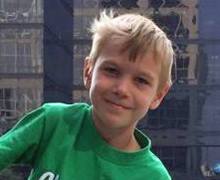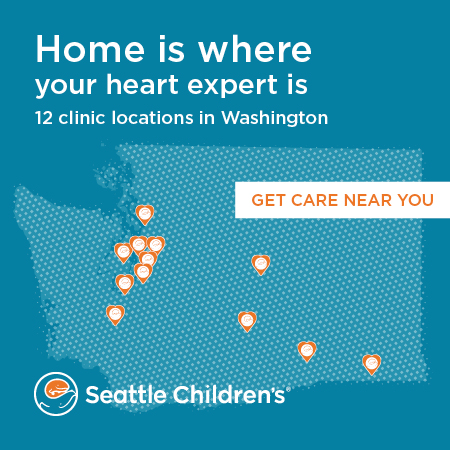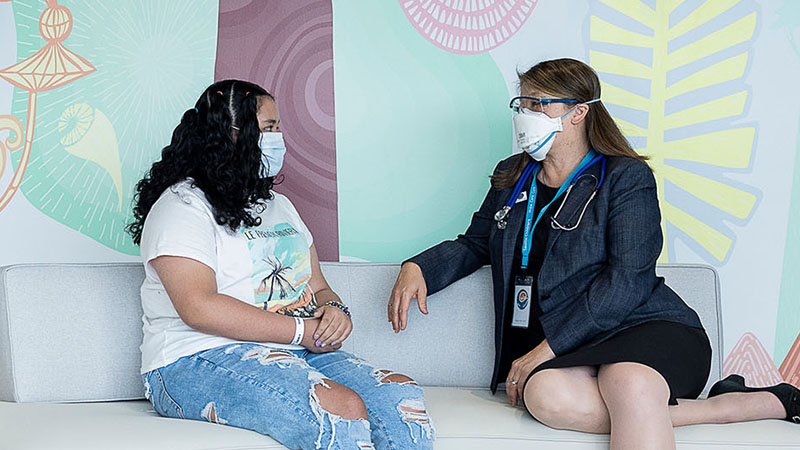Pediatric Thyroid Cancer
What is thyroid cancer?
Thyroid cancer is the growth of abnormal cells in the . A lump (nodule) in the thyroid can be cancerous (malignant) or noncancerous (benign). Most are noncancerous, but 20% to 30% of thyroid nodules in children and adolescents are cancerous. The survival for children and teens with thyroid cancer is excellent.
Types of thyroid cancer
Papillary thyroid carcinoma (PTC) is the most common type of thyroid cancer in children, adolescents and young adults. PTC accounts for 90% of thyroid cancers in patients of this age range.
Less common types of thyroid cancer include:
- Follicular thyroid carcinoma.
- Medullary thyroid carcinoma (MTC). People with MTC often have an inherited condition called multiple endocrine neoplasia type 2 (MEN 2).
Our Cancer Predisposition Clinic screens and cares for children born with a change that raises their cancer risk. Finding tumors early may improve outcomes.
Cancer and Blood Disorder Care at Seattle Children's
What are the symptoms of thyroid cancer?
Thyroid cancer may not cause symptoms in your child. But some children and adolescents may have:
- A lump in the neck
- Voice changes
- Trouble breathing or swallowing
If your child has no symptoms, you may find out about a thyroid condition because the doctor feels something that is not normal in your child’s neck during a regular check-up.
-
Risk factors
The chance of thyroid cancer is higher in children and adolescents who have:
- Been exposed to past medical treatment with radiation to the neck
- Graves disease
- Hashimoto disease
- Family history of thyroid cancer (familial thyroid cancer)
- MEN syndromes
- PTEN syndrome (Cowden syndrome).
How is thyroid cancer diagnosed?
To diagnose thyroid cancer, the doctor will do a physical exam and may order these tests:
- Ultrasound of the neck to learn about the size and appearance of the thyroid and nearby
- Blood tests to check the levels of thyroid hormones and antibodies that can affect how the thyroid works
- Fine needle aspiration (FNA) of the lump to check the cells under the microscope
If multiple endocrine neoplasia type 2 (MEN 2) runs in your family, your doctor may suggest genetic testing and genetic counseling. This can help tell whether your child has MEN 2 and can give you information about your options.
Our Cancer Predisposition Clinic screens and cares for children born with a genetic change that raises their cancer risk. People with MEN 2 are at high risk for thyroid cancer, so families may choose to have their child’s thyroid removed— most often before age 5 — to prevent cancer from starting.
-
Imaging studies
Imaging studies are pictures of the inside of your child’s body. They help doctors see the size and texture of your child’s thyroid and check for nodules or other signs of disease. These studies may include:
- Ultrasound of your child’s neck
- CT (computed tomography) scan
- MRI (magnetic resonance imaging) scan
- Thyroid nuclear medicine uptake and scan
-
Fine-needle aspiration (FNA)
The purpose of FNA is to tell whether a lump in the thyroid or an abnormal lymph node in the neck is cancer (malignant) or not cancer (benign).
When we need a sample of tissue from the thyroid, Seattle Children’s surgeons often use a biopsy method called fine-needle aspiration. An FNA takes a sample of cells using a very thin needle guided by . It is less invasive than cutting into the skin. It also avoids the need for medicine to sedate your child () for this procedure. But if needed, FNA can be done under anesthesia.
Fine-Needle Aspiration Biopsy at Seattle Children’s (Video. 3:07)
Our Ear, Nose and Throat (ENT) team explains how we assess an abnormal lump in the thyroid.
How is thyroid cancer treated?
Our experts work as a team to treat children, teens and young adults with thyroid cancer. , surgeons, , , and work together to give your child the most up-to-date care for the best outcome possible.
U.S. News & World Report consistently ranks our Cancer and Blood Disorders Center among the best pediatric oncology programs in the country. Seattle Children’s has the most experienced pediatric Solid Tumor team in the Pacific Northwest. We tailor treatment to your child.
Surgery is the main treatment for thyroid cancer. Some patients receive radioactive iodine or .
Your child's health care team will suggest a treatment plan based on:
- The tumor size
- Whether it has spread to the lymph nodes or other parts of the body
- If blood tests show a tumor marker (called thyroglobulin)
- Your child's age and overall health
- Your family’s preferences
-
Surgery
If your child has lumps in their thyroid that might be cancer or are cancer, we recommend surgery. This is the most common treatment for thyroid cancer.
- In most cases, removing both lobes of the thyroid (total thyroidectomy) is best.
- Less often, surgeons will remove one lobe (lobectomy)
If the cancer has spread to the lymph nodes in the neck, they may also need to be removed during surgery.
Surgery is done at our hospital campus in Seattle.
Read more about thyroidectomy (PDF) and surgery to treat tumors at Seattle Children’s.
-
Radioactive iodine
Some patients will have a radioactive iodine scan a few months after surgery to check for other areas of disease.
If the test finds other potential areas of cancer, doctors will likely recommend radioactive iodine (I-131) treatment.
- Your child swallows a small amount of radioactive iodine.
- The amount of radiation depends on where the scan shows cancer.
- The thyroid and thyroid cancer cells absorb the radiation.
- The high dose of radiation destroys the thyroid cells and any cancer cells.
-
Targeted therapy
Sometimes it is helpful to do of the thyroid cancer tissue. If the testing finds specific cancer biomarkers, targeted therapy[K2] may be a treatment option. may be most helpful if thyroid cancer does not respond to radioactive iodine (refractory) or is spreading (progressive). New treatments are being studied in clinical trials for people with thyroid cancer that shows certain molecular changes. Ask your doctor about clinical trials that may help your child.
-
Thyroid hormone replacement
If your child has surgery to remove the whole thyroid, they will need to take thyroid hormone replacement pills so their body gets this important hormone. Thyroid hormone replacement therapy suppresses thyroid-stimulating hormone (TSH) and lowers the risk that any cancer cells can grow.
Research and Clinical Trials for Pediatric Thyroid Cancer
Some people with thyroid cancer take part in research studies of new therapies along with their standard medical treatment. These studies are called clinical or therapeutic trials.
Some of the latest clinical trials focus on targeted therapy for people with specific cancer identified by . Your doctor will talk with you about any new treatment options that might help. Then you can decide whether you want to take part.
Learn more about cancer clinical trials at Seattle Children's
- Find many clinical trials offered at Seattle Children’s on our Current Research Studies page or on ClinicalTrials.gov. Read our guide about searching for trials on ClinicalTrials.gov (PDF).
- Contact us at 206-987-2106.
- Email us at [email protected].
- Read more about cancer research and clinical trials at Seattle Children’s.
Follow-up Care for Pediatric Thyroid Cancer
Follow-up care is important after treatment for pediatric thyroid cancer. Your doctor will let you know the follow-up routine that’s right for you. Regular thyroid ultrasounds and blood work will be part of follow-up care.
If your child is taking thyroid hormone replacement, they will need regular blood tests to make sure any remaining thyroid tissue or cancer cells are suppressed.
Our Cancer Survivor Program provides long-term follow-up care to help young people stay healthy after being treated for cancer in childhood. Most of our patients visit Seattle Children’s for follow-up care for 5 years. If you live far from Seattle, your child may get some follow-up care from a cancer doctor in your own community.
During follow-up visits at Seattle Children’s, your child’s team will:
- Look for any signs that cancer is returning
- Check for effects that may happen months or years after treatment
- Tell you about any risk for other cancers and signs to watch for
Why choose Seattle Children's for thyroid cancer care?
Children, teens and young adults treated for thyroid cancer at Seattle Children’s have excellent outcomes. Our thyroid cancer specialists with expertise in , surgery, , and work as a team to care for your child.
Our pediatric oncologists provide up-to-date care that includes both standard treatments and new (novel) targeted therapies when needed. We also offer clinical trials of new treatments for some types of thyroid cancer.
When possible, we personalize treatment based on the genetic profile of your child’s cancer. This approach is called precision medicine. An example is the use of for people with cancer cells that have specific changes.
The experts you need for complete care
Seattle Children’s has the only multidisciplinary program in the Pacific Northwest that specializes in children, adolescents and young adults with thyroid conditions. Our Thyroid Program brings together experts from oncology, otolaryngology, endocrinology and other fields to diagnose and treat all types of thyroid problems. Our team works together — and with you — to provide treatment specific to your child.
Our head and neck surgeons (otolaryngologists) do many thyroid surgeries each year. We are considered a high-volume surgical center.
Year after year, our Cancer and Blood Disorders Center is ranked among the nation’s best by U.S. News & World Report.
Your child will benefit from the work of physician-scientists at Fred Hutchinson Cancer Center and UW Medicine, as well as at Seattle Children’s. The National Cancer Institute has named our partnership a comprehensive cancer center.
 “To watch Ashton’s health improve before our eyes over the last few months has been such a gift, we’ve had to pinch ourselves a few times. . . . I can’t imagine where we would be without the treatment we got at Seattle Children’s. The drug seems like a dream for both doctors and patients.”
“To watch Ashton’s health improve before our eyes over the last few months has been such a gift, we’ve had to pinch ourselves a few times. . . . I can’t imagine where we would be without the treatment we got at Seattle Children’s. The drug seems like a dream for both doctors and patients.”
-Kayley Leeds, describing her son’s health after targeted therapy at Seattle Children’s
Specialists in caring for children, adolescents and young adults
Our specialty is treating thyroid cancer while helping our patients grow to be healthy and productive adults.
Our team cares for your whole child. As needed, they will receive care from specialists in nutrition, pharmacy, social work and emotional health. Read more about the supportive care we offer.
Children, adolescents and young adults deserve care designed just for them. Our experts focus on how treatments today affect growing bodies in the future. We plan treatments based on years of experience and the latest data and research on what works best and is safest.
We know that teens and young adults with cancer have different challenges than young children. Our Adolescent and Young Adult Cancer Program focuses on their needs, which may include fertility preservation.
Support for your whole family
Having a thyroid tumor can be scary. We help your family all along the way.
During visits, we take time to explain your condition. We help you fully understand your treatment options and make the choices that are right for your family.
Our doctors, nurses, child life specialists and social workers help your family through the challenges. We connect you to community resources and support groups.
At Seattle Children’s, we work with families from around the Northwest and beyond. Whether you live nearby or far away, we can help with financial counseling, schooling, housing, transportation, interpreter services and spiritual care. Read about our services for patients and families.
Contact Us
If you would like an appointment, ask your child’s primary care provider to refer you.
- If your child has been diagnosed with cancer and you have a referral or would like a second opinion, contact the Cancer and Blood Disorders Center at 206-987-2106.
- If your child needs their thyroid checked or has a referral for a fine-needle aspiration biopsy of the thyroid, contact Otolaryngology at 206-987-2105. Before scheduling a fine-needle biopsy, your child will need a blood test to measure thyroid-stimulating hormone (TSH). Your primary care doctor can order this test.
Providers, see how to:
Related Links
- Cancer Resources for Patients and Families
- Otolaryngology Resources
- Endocrinology Resources
- Thyroid Program
Paying for Care
Learn about paying for care at Seattle Children’s, including insurance coverage, billing and financial assistance.


